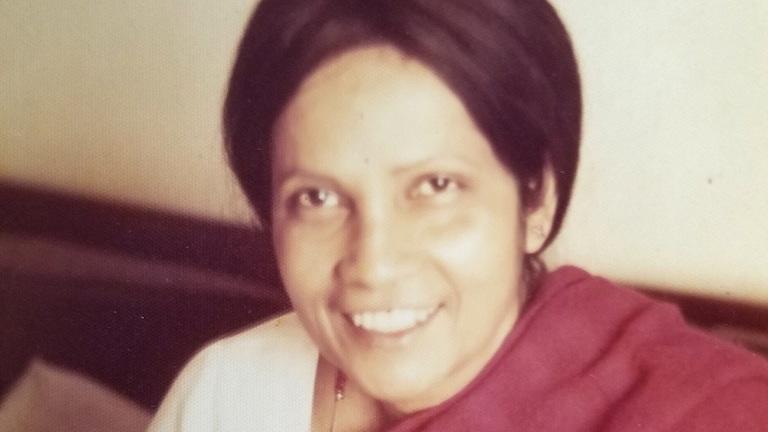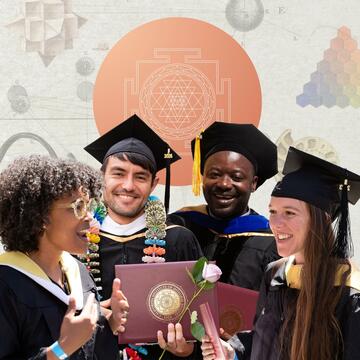
Biography of Dr. Rina Sircar
Dr. Rina Sircar is professor emerita at California Institute of Integral Studies (CIIS) in San Francisco, California where she taught as a professor in the Philosophy and Religion Department for nearly four decades from 1974 to 2013. From 1988-1992 she was named the distinguished Haridas Chaudhuri Professor of South Asian and Comparative Philosophy and later held the World Peace Buddhist Chair at CIIS. In addition, she received the honorary title of Vidasanachariya from Calcutta in 1982, and Dhammaratna from Bangladesh.
Rina earned an MA (1957) from University of Rangoon and a doctoral degree (1974) in Indian Philosophy from Gujarat University in India as well as a second PhD (1976) in South Asian Studies from the California Institute of Asian Studies. She also received degrees in Law, Oriental Philosophy, and the Abhidhamma and Sutta Pitakas from Rangoon University in Burma.
In addition to nearly five decades of teaching experience and several publications, Rina is co-founder and resident meditation teacher of Taungpulu Kaba-Aye Monastery and its San Francisco center, and conducts retreats on mindfulness, insight, healing and death and dying in the Theravada forest tradition. Her areas of specialty are Buddhist Psychology, Pali language, healing, and chanting. Her publications include a book entitled Psycho-ethical Aspects of Abhidhamma published in 1999.
Early Life and Education
Rina Sircar was born in Burma (now called Myanmar), one of the strongholds of Theravada Buddhism, in the delta district of Pyapon where her family maintained rice mills. She attended Pyapon State High School where she began her study of the scriptural languages Pali and Magadhi. As soon as she was eligible to join Rangoon University she joined her mother and the rest of her family in the capital city of Rangoon (Yangon). Rina continued her education, completing many Pali as well as Sutta and Abhidhamma (Buddhist psychology) examinations and Abhidhamma (Buddhist psychology) examinations. Her primary Abhidhamma teacher was the world renowned Very Venerable U Thittila who had taught at Oxford for more than 20 years and worked with the President of London's Pali Text Society, Mrs. Rhys Davids and I.B. Horner on translations of canonical Pali texts. She also studied with other famous teachers such as U Posa, Dr. Kar, and Dr. Hla Bu. In addition she earned a degree in Law, specializing in equity and trust. During her teaching career at the University of Rangoon (six years) and at the University of Mandalay (three years) Rina taught B.A. and M.A. honors classes in mathematical logic, oriental philosophy, comparative philosophy and advanced Buddhist studies. She passed the highest exams in Sutta and Abhidhamma philosophy and earned certificates in Sutta-visaradha and Abhidhamma-visaradha.
Rina's father was a famous dermatologist who worked with the British army during World War II. In 1942 he was sent back to Rangoon due to a heart condition and passed away at the age of forty-four when Rina was only two years old, leaving her mother a young widow in her early thirties with seven children to raise. Her mother turned to a life of meditation and began renouncing worldly concerns. She practiced her meditation day and night, rarely spoke, and embraced voluntary poverty in the midst of an affluent family. Due to her intensive practice, her very presence created a healing atmosphere and people from all over the country used to visit her just to get her touch. Rina, though too young to understand her mother's spiritual progress, stayed close to her and never left except to go to school. Gradually her mother taught her all the practices of healing in the forest tradition; Rina became her attendant, accompanying her everywhere, cooking for her and looking after all her needs.
One of Rina's older brothers, Dr. Albert Sircar, who served as a doctor in the Burmese army was once asked to attend a Buddhist teacher known as the Very Venerable Taungpulu Tawya Kaba-Aye Sayadaw, a reclusive monk who had devoted his life to the pursuit of spiritual experience and knowledge in the forest tradition of Therevada Buddhism. He had achieved very advanced levels of practice and was venerated as a fully realized saint. Following this initial encounter, the Sircar family invited Taungpulu Sayadaw to come to Rangoon. Subsequently the Sircar family established their home as a city-monastery for the Very Venerable Taungpulu Tawya Kaba-Aye Sayadaw.
Though Rina's mother was her first meditation instructor, she told Rina and her brothers and sisters to surrender themselves at the feet of the great saint Very Venerable Taungpulu Kaba-Aye Sayadaw and to take training from him in all spiritual matters. Rina travelled to the Sayadaw's remote monasteries in the hamlets of Taungpulu and Tezu in order to practice meditation and to receive instruction from the great forest ascetic. Taungpulu Sayadaw's attendant monk, the Venerable Thazi Sayadaw, was also very accomplished in the fields of Sutta and Abhidhamma studies and taught Rina whenever he was in Rangoon.
The Sircar family moved to India in 1971 after the Burmese government nationalized all private business and educational institutions. She continued studying in India and received a doctorate in Buddhist Studies from the University of Gujurat in 1974. In 1973 she was invited to join the Pali Text Society by I.B. Horner. She was also invited to teach in the University of London Oriental and African Studies, but instead accepted the invitation of Dr. Haridas Chaudhuri to come to San Francisco and teach Buddhist studies at his newly founded graduate school, the California Institute of Asian Studies (now CIIS). After arriving in San Francisco, Rina began teaching courses in Buddhism, meditation and healing and wrote a second doctoral dissertation titled The Psycho-ethical Aspects of Buddhism, thus earning a second Ph.D. in South Asian Studies from the California Institute of Asian Studies in 1976.
Founding the Taungpulu Kaba-Aye Monastery
In 1977 Dr. Sircar took seven students to Burma to visit Taungpulu Sayadaw and to invite him to visit The United States. The Sayadaw was very happy to have the opportunity to introduce the Dhamma teachings to a western country, and even though he was 80 years old during his first visit in 1978, he happily accepted a second invitation.
In 1981 he established a forest monastery in Boulder Creek near Santa Cruz, California during his second visit, and during his third visit in 1983 constructed a world peace pagoda. Although other Theravada Buddhist centers and temples were founded by Sri Lankan and Thai monks in previous decades, The Taungpulu Kaba-Aye (world peace) Monastery (TKAM) was the first of its kind in the United States with an authentic Burmese style pagoda which housed a meditation hall.
When the Sayadaw passed away in 1986, Rina and her students attended the cremation ceremony in Burma and later constructed a memorial stupa to hold his relics.
Dr. Rina Sircar has made a unique contribution to the field of Buddhist studies at CIIS over the course of her long career. As a representative of an authentic ancient lineage in the Theravada forest tradition and as a disciple of one of the greatest Buddhist masters of the twentieth century, she is one of the earliest and the first female teacher who brought the wisdom teachings and meditation practices of the oldest school of Buddhism to the United States. The Theravada tradition is primarily focused on the practice of meditation, psychoethical training and psychospiritual transformation. Rina's meditation classes and retreats in the satipatthana-vipassana tradition were the earliest of their kind in California in the 1970s and the Taungpulu Kaba-Aye Monastery which she cofounded still remains the only Theravada forest monastery in the U.S. with original Burmese designed pagoda and stupa structures.
Rina has been instrumental in arranging for Burmese monks to visit and stay at the TKAM center and elsewhere in the Bay Area. Many of Rina's close students have traveled with her to Burma and other parts of Asia on a number of occasions gaining first-hand experience of the living Buddhist traditions and teachings. Because of her emphasis on healing and Buddhist psychology Rina attracted numerous physicians, psychotherapists and healers among her students many of whom attended her retreats and classes for decades and contributed to the emerging holistic healing and psychology and integrative medicine in recent years.
TKAM has also served as an important religious center for the Bay Area Burmese community since its inception. Several important Buddhist festivals and auspicious days are observed and celebrated at TKAM every year providing an opportunity for many to observe and participate in genuine Buddhist culture.
